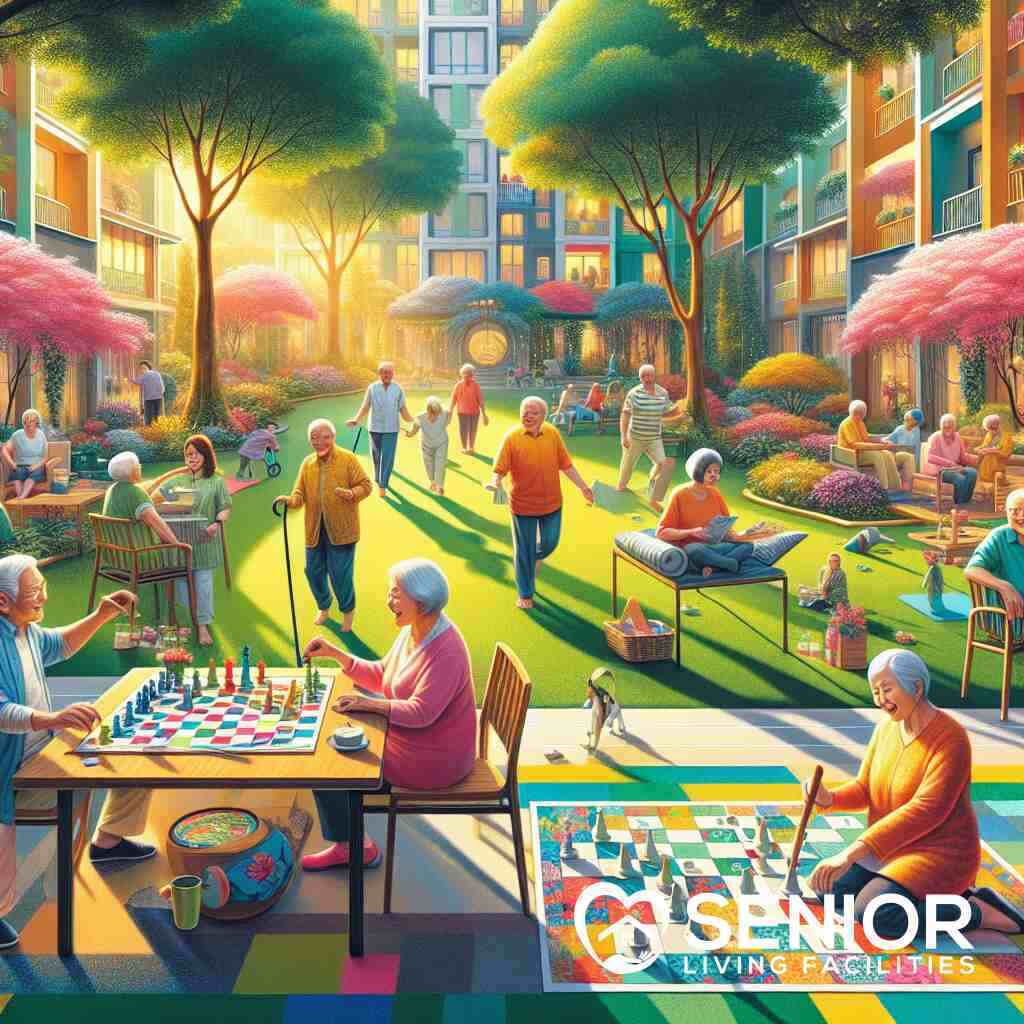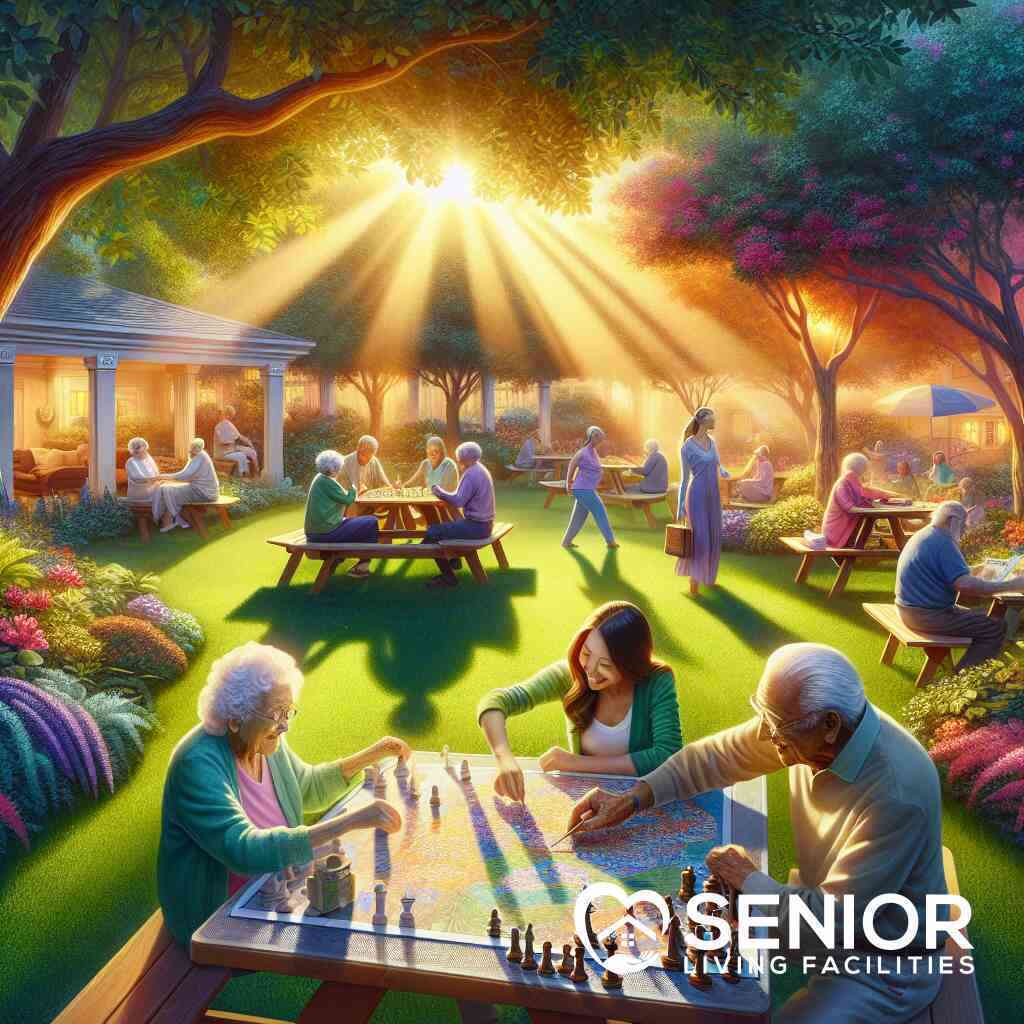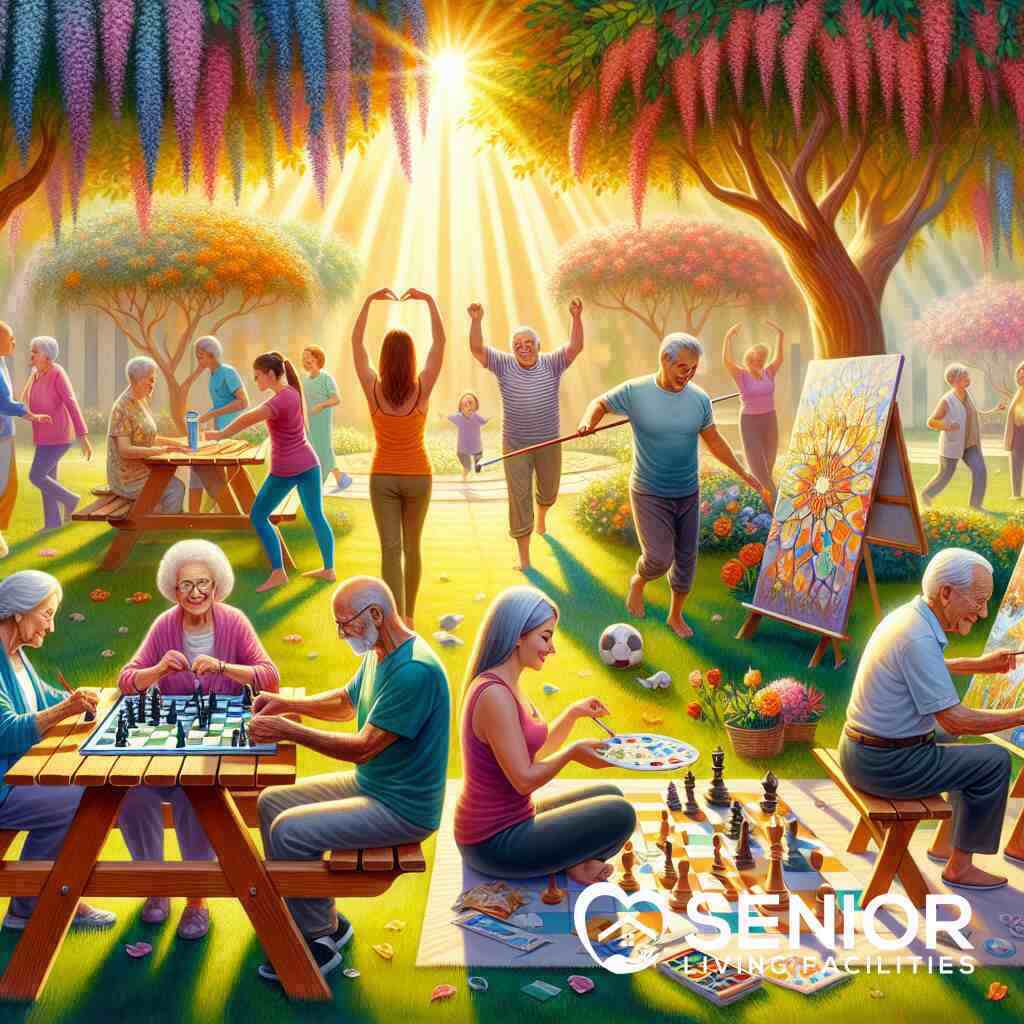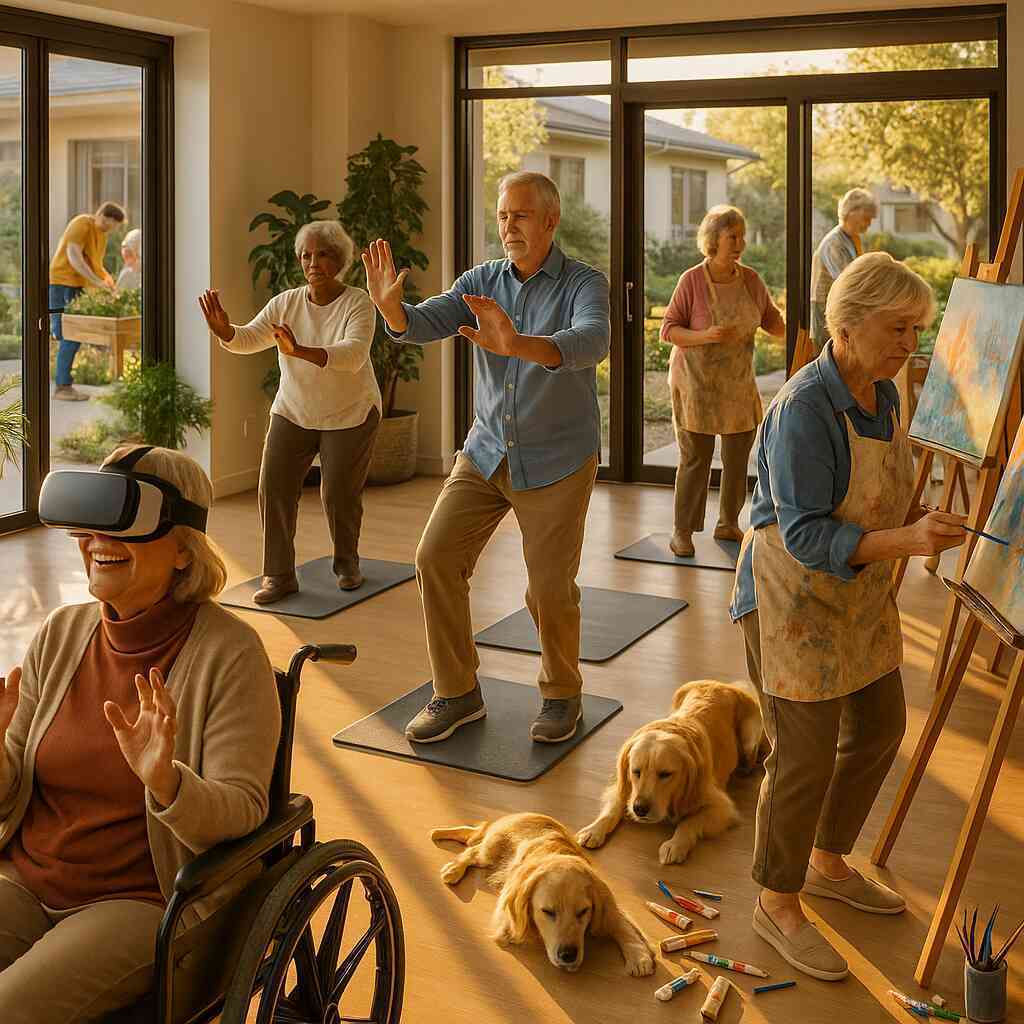
The Complexities of Cognitive Wellness in Senior Living Facilities
January 16, 2025
Navigating the Maze of Cognitive Wellness in Senior Living
Understanding Cognitive Health in Older Adults
Cognitive health in older adults encompasses the maintenance of mental sharpness, memory, and the ability to learn new things. As individuals age, they often face cognitive changes that require specialized attention. Caring for cognitive health is vital, as it directly impacts one’s quality of life and everyday interactions. Many older adults are eager to engage in mental wellness support for seniors to fortify their cognitive abilities and delay potential decline. Recognizing early symptoms and employing appropriate interventions can foster longer periods of cognitive wellness.
Cognitive health resources in senior living communities have become increasingly essential. These resources include engagement in brain-stimulating activities, nutritionally balanced diets, and regular physical activities. Additionally, senior communities are leveraging technology to enhance cognitive enrichment, offering digital tools that track cognitive progress and suggest personalized exercises. Such comprehensive strategies ensure that seniors not only maintain their cognitive functions but also experience a socially enriching environment.
The Senescence of the Mind: Challenges and Opportunities
Brings inevitable challenges, with cognitive decline posing significant distress for seniors and their families. Age-related cognitive decline may manifest in various forms, ranging from mild forgetfulness to more severe conditions such as dementia. Recognizing these challenges, senior living facilities have stepped up with cognitive wellness programs for older adults to address these issues head-on.
Opportunities lie in the innovative approaches to cognitive care. Advances in neurological research have paved the way for the development of personalized cognitive training for the elderly, tailored to individual needs and cognitive baselines. These training programs aim to enhance memory, attention, and problem-solving skills, thereby improving the overall quality of life. By understanding the aging process and applying holistic interventions, we can better support the aging mind in remaining active and engaged.
The Role of Senior Living Facilities in Cognitive Wellness
Senior living facilities play a critical role in fostering cognitive wellness through dedicated programs and supportive environments. As a hub for elder care, these facilities employ diverse strategies to aid cognitive health, from therapeutic recreation for elderly cognitive health to structured social activities that stimulate the mind. Facilities are designed to provide residents with opportunities to engage in meaningful cognitive exercises daily.
Senior living facilities are equipped with trained staff to deliver quality mental care within communities, ensuring that cognitive needs are met with excellence and compassion. They foster environments that encourage participation in cognitive stimulation programs, which have been proven to delay the progression of cognitive decline. By creating spaces where older adults can thrive mentally, these facilities significantly contribute to their residents’ overall well-being and sustained cognitive health.
Holistic Approaches to Cognitive Health for the Elderly
Integrative Therapies: Enhancing Cognitive Function in Seniors
Integrative therapies offer a promising avenue for enhancing cognitive function in seniors. These therapies amalgamate traditional medicinal practices with complementary approaches, thus addressing cognitive wellness comprehensively. From mindfulness exercises to acupuncture, integrative therapies provide nurturing interventions that stimulate cognitive faculties. They not only aim to improve memory and mental clarity but also focus on overall well-being. Facilities offering integrative therapies for cognitive enhancement provide customized programs mindful of each resident’s unique cognitive needs. Furthermore, these approaches bridge the gap between physical health and mental wellness, ensuring seniors enjoy a balanced lifestyle.
Integrative therapies directly enhance cognitive function and reduce stress and anxiety, which are known contributors to cognitive decline. Incorporating therapies such as tai chi or yoga into daily routines can be powerful in boosting mental resilience. These activities promote relaxation and focus, allowing seniors to remain engaged and mentally active. By embracing both modern science and timeless wisdom, senior living communities are empowering older adults to live their days with renewed mental clarity and confidence.
Therapeutic Recreation and Its Impact on Neuroplasticity
Therapeutic recreation plays a pivotal role in fostering neuroplasticity, the brain’s ability to reorganize itself by forming new neural connections. This kind of recreation involves a spectrum of activities designed to maintain and improve mental agility through engagement and learning. Programs emphasizing therapeutic recreation for elderly cognitive health leverage creative arts, music, games, and social interaction to activate different brain regions, fostering resilience against cognitive decline.
Neuroplasticity is vital in aging adults as it supports cognitive recovery following incidents such as strokes or the onset of dementia. By continuously challenging the brain, these recreational activities help seniors adapt better to age-related changes. Not only do they offer fun ways to spend time, but they also provide the crucial cognitive stimulation needed to maintain mental faculties. As such, therapeutic recreation serves as both a preventive measure and a mode of therapy, promoting longevity in cognitive health.
Moreover, engaging activities like puzzles, memory games, or group discussion sessions enhance social bonds, reducing feelings of isolation and depression. These interactions are vital for maintaining emotional and cognitive health, with the added benefit of enhancing seniors’ quality of life. Senior living facilities employing therapeutic recreation not only cater to cognitive needs but also enrich the social lives of their residents.
Designing Dementia-Friendly Environments
Creating dementia-friendly environments is crucial in supporting individuals with dementia to maintain independence and quality of life. Such environments are thoughtfully designed to cater to the unique needs of residents, minimizing stress and enhancing safety and comfort. Features like clear signage, accessible layouts, and calming color schemes are common in dementia-friendly environments in senior living.
Senior living facilities incorporate multiple strategies to ensure their environments support ease of navigation and reduce confusion. Consistent routines, personalized living spaces, and visual aids contribute to a sense of familiarity and safety for residents with dementia. Furthermore, the integration of nature, such as gardens or outdoor walking paths, offers therapeutic benefits, promoting tranquility and well-being.
Such environments also support cognitive health by reducing over-stimulation and providing sensory cues that facilitate memory recall and orientation. They encourage residents with dementia to engage interactively, fostering cognitive engagement without overwhelming the senses. This design philosophy not only supports the practical aspects of daily living but also nurtures a dignified and enriched life for seniors coping with memory impairments. By prioritizing resident-centered design, facilities aim to enhance the well-being and self-esteem of older adults in their care.
Innovative Strategies in Senior Living Communities
Personalized Cognitive Training Programs
Senior living communities are integrating personalized cognitive training for the elderly to address unique cognitive needs efficiently. These programs are meticulously designed to align with each individual’s cognitive baseline, offering tailored exercises that focus on enhancing specific mental faculties such as memory and attention. By utilizing detailed assessments, facilities can craft experiences that target particular areas in need of development, thus providing seniors with meaningful and manageable mental challenges.
Through this customization, older adults not only work on areas needing improvement but also encounter new learning pathways that keep their minds engaged. Various cognitive exercises, including problem-solving tasks and memory-enhancing games, are frequently incorporated. By committing to these personalized training programs, seniors can experience significant improvements in mental agility and cognitive function. Additionally, these tailored experiences result in elevated life quality and foster a greater sense of accomplishment and independence among residents. As the importance of personalizing care becomes increasingly recognized, these strategies are fundamental to promoting cognitive wellness in senior communities. Ties The Ultimate Review of Senior Living Locations Near You.
Technological Interventions in Enhancing Brain Health
Technology plays a pivotal role in enhancing brain health within senior living facilities. From engaging apps designed to promote cognitive function to devices that track cognitive health metrics, technology offers an innovative approach to elder care. Interactive platforms provide residents with easy access to brain exercises tailored to individual levels of cognitive capability. This not only fosters mental agility but also contributes positively to the overall well-being of seniors.
Moreover, virtual reality (VR) and augmented reality (AR) are increasingly employed to offer immersive cognitive experiences. These technologies can simulate environments for exploration or invite residents to partake in virtual travels, thereby stimulating the brain’s learning centers. Senior communities leverage these tools to create dynamic, engaging experiences that keep seniors motivated to participate in cognitive activities daily.
Tech-based interventions are not only enjoyable but also essential in driving new neural pathways and maintaining brain health. This reliance on technology highlights the commitment of senior living facilities to adopt modern strategies that support a holistic approach to cognitive wellness. By implementing these technological interventions, facilities can offer residents cutting-edge resources that align with contemporary advancements in cognitive care.
Proactive Measures for Cognitive Decline Prevention
Proactively addressing the prevention of cognitive decline in seniors is a critical component of fostering long-term mental wellness in senior communities. Such measures often include the integration of comprehensive lifestyle changes to support cognitive health, such as balanced nutrition, regular physical activity, and consistent social interaction. These elements work synergistically to create an environment where cognitive decline is slowed, allowing residents to enjoy a higher quality of life.
Additionally, continuous cognitive assessments and monitoring enable staff to identify early signs of cognitive challenges in residents. These insights guide the development of individualized plans that focus on cognitive enhancement and maintenance, custom-tailored to meet the senior’s specific needs. Moreover, memory-supportive programs are actively incorporated and designed to engage residents in activities that stimulate various brain regions and promote mental rigor.
Learning opportunities, community involvement, and cognitive exercises form a trifecta aimed at staving off cognitive decline. Facilities are increasingly prioritizing these proactive approaches to not only prevent decline but also support resilience and adaptability in aging minds. By embracing such measures, senior living communities contribute significantly to the sustained cognitive health and well-being of their residents.
The Pillars of Quality Mental Care for Seniors
Nurturing Emotional and Psychological Support
Providing emotional and psychological support in elder care is foundational to fostering holistic well-being in senior living facilities. An environment where seniors feel heard and supported enhances their ability to cope with life changes, including cognitive shifts. Many communities employ mental health professionals who work closely with residents to address issues such as grief, loneliness, and anxiety. Recognizing these emotional needs is as crucial as attending to physical health, allowing seniors to sustain a meaningful and connected life.
Furthermore, these senior living facilities often integrate activities that promote social interaction, such as group discussions, art therapy, and music sessions. These pursuits not only strengthen social ties but also uplift spirits and create a supportive community atmosphere What Defines Quality in Senior Living Facilities Near You?. Tailored interventions, including mindfulness practices and relaxation techniques, help seniors build resilience against cognitive decline. By nurturing a strong emotional foundation, senior communities empower their residents to thrive cognitively and emotionally.
To fully embrace the holistic approach, facilities may partner with external support networks and provide resources that offer continuous emotional support. Efforts focused on mental resilience ensure that seniors not only retain autonomy but also experience a sense of purpose within their community.
Implementing Cognitive Stimulation Programs
Senior living facilities increasingly prioritize cognitive stimulation programs in senior housing to bolster brain health and delay cognitive decline. These programs consist of structured activities such as puzzles, memory games, and skill development sessions, which challenge seniors intellectually. By introducing varied cognitive exercises, facilities aim to maintain residents’ mental agility and foster new learning opportunities essential for sustaining brain functionality.
Activities focusing on logic, reasoning, and creativity are vital components of these programs, setting the stage for comprehensive cognitive engagement . Exploring Cognitive Tools in Modern Senior Living Spaces. They encourage seniors to think critically and adapt to new challenges, thus cultivating neuroplasticity. In doing so, these cognitive stimulation programs not only preserve brain function but also promote a sense of achievement and enjoyment.
Integrating technology into these programs, such as digital brain-training applications, can further enhance engagement and motivation among residents. Top 5 Innovative Senior Living Facilities Near Me. By adopting these modern strategies, senior living communities not only address cognitive wellness but also create an environment where seniors feel invigorated and empowered to continue learning.
Evaluating Senior Cognitive Assessment Techniques
Accurate and regular assessment of cognitive function in aging adults is a cornerstone in managing and enhancing cognitive wellness. Senior living facilities utilize various evaluation methodologies to gauge residents’ cognitive abilities, tracking changes over time to inform care plans. These assessments may include standardized tests, observational evaluations, and self-reported questionnaires, providing a comprehensive view of cognitive health.
Such continuous evaluations are pivotal in identifying early signs of cognitive impairment or decline, enabling timely intervention and tailored care strategies. By understanding individual cognitive trajectories, facilities can design personalized programs that target specific needs, enhancing the effectiveness of interventions.
Moreover, these assessments are vital for memory care facilities and Alzheimer’s management, guiding therapeutic approaches and support services. Not only do they help in mitigating further decline, but they also offer families peace of mind, knowing their loved ones are receiving appropriate attention and care in their senior living community. This ongoing commitment to assessment and adaptation ensures a proactive approach to sustaining cognitive health throughout the aging process.
Building a Neuro-Wellness Culture in Senior Housing
Fostering a Culture of Cognitive Engagement
Fostering a culture of cognitive engagement within senior living facilities is paramount to enhancing cognitive wellness. By embedding brain health-focused senior living strategies into daily routines, facilities can inspire residents to participate in cognitive exercises that nurture mental agility actively. Engaging residents in stimulating pursuits, such as book clubs, art classes, or brain games, provides not only cognitive stimulation but also opportunities for social interaction, which is crucial for mental health.
Incorporating technology advances, such as apps specifically designed for seniors, into these cognitive activities can enrich participation. For example, using tablets for virtual museum tours or guided meditation apps can invigorate the mind. Communities should aim to create a balanced schedule that encourages residents to explore various activities catered to different cognitive levels. Such a structured approach not only maintains cognitive function but also cultivates a supportive environment where seniors feel motivated to stay mentally active.
Encouraging lifelong learning is another key aspect of fostering cognitive engagement. Senior facilities may collaborate with nearby educational institutions to offer courses tailored for the elderly, promoting continuous intellectual growth. This kind of integration fosters a dynamic learning atmosphere, reinforcing the message that mental acuity can thrive well into the later years. Ultimately, creating a culture of engagement requires commitment and innovation but promises enriched lives for seniors.
Promoting Emotional Resilience in Senior Communities
Promoting emotional resilience is a fundamental aspect of enhancing cognitive wellness in senior housing. Emotional resilience is crucial for helping residents manage stress, cope with loss, and adapt to various life changes. Senior living facilities often integrate programs and activities that focus on building resilience, such as mindfulness meditation, gentle yoga, and group therapy sessions. These initiatives are designed to help seniors foster a positive outlook and develop coping mechanisms for emotional challenges.
Another vital component is creating supportive social networks within the community. By organizing group activities, residents can form meaningful connections and a sense of belonging, significantly reducing feelings of isolation. Social bonds are essential for emotional well-being and have a positive impact on cognitive health, contributing to overall life satisfaction.
Understanding the powerful connection between emotional health and cognitive function, senior communities strive to maintain a compassionate environment. Trained professionals often offer personalized counseling sessions, guiding residents through their emotions. Understanding Senior Housing as Defined by Industry Experts. By prioritizing emotional support as part of holistic wellness strategies, facilities ensure that seniors have the resources they need to thrive in all aspects of life.
The Future of Cognitive Wellness in Housing Options for Seniors
The future of cognitive wellness in housing options for seniors is set to explore groundbreaking innovations that align with the evolving needs of aging populations. Technological advancements will continue to play a decisive role, from personalized cognitive training programs to virtual reality tools that enhance brain health. As part of forward-thinking initiatives, communities are poised to develop strategies that seamlessly integrate cognitive practices into senior routines, ensuring sustainable cognitive engagement.
In response to increasing demand, facilities will likely expand their offerings to include advanced brain fitness centers and dedicated areas for cognitive therapy. These specialized spaces will focus on providing residents with the tools and guidance necessary to maintain and extend cognitive vitality. As science continues to unveil insights into neuroplasticity and brain exercises for seniors, these innovations promise enhanced outcomes in cognitive care.
Furthermore, the design of senior communities will evolve to incorporate more dementia-friendly features, emphasizing accessibility and comfort. With a robust commitment to quality mental care within senior communities, housing options will adapt to ensure they meet the versatile needs of residents with varying cognitive health challenges.
In essence, the future of cognitive wellness in senior living encompasses a fusion of technology, innovation, and individualized care, allowing older adults to age with dignity. For residents in senior communities, this means not just living long but living well, with comprehensive cognitive support tailored to enrich their journey.
Reflecting on Cognitive Wellness Journeys
Integrating Mindful Practices in Daily Routines
Integrating mindful practices in daily routines significantly impacts cognitive wellness for older adults. These practices, including meditation and breathing exercises, offer mental wellness support for seniors by fostering relaxation and reducing stress. In senior living facilities, mindfulness is increasingly recognized as a cornerstone of cognitive health strategies, blending seamlessly into residents’ daily lives. This integration promotes heightened awareness and emotional stability, which are crucial in navigating life changes that come with aging. Navigating Senior Living Facilities in the Modern Era.
Senior communities are progressively adopting mindfulness programs, encouraging residents to participate regularly How Does Senior Living Facilities Enhance Cognitive Care?. These sessions are designed not only to calm the mind but also to enhance cognitive function by keeping the brain actively engaged. Activities like mindful walking or guided meditation help seniors develop a sense of presence and clarity, which are vital components in maintaining mental agility. By embedding these practices into routine schedules, facilities aim to create environments where cognitive wellness blossoms naturally, supporting long-term mental health.
Celebrating Success Stories in Cognitive Health
Celebrating success stories in cognitive health humanizes the journey toward cognitive wellness and inspires continued engagement in senior living communities. These narratives highlight personal triumphs in memory retention, attention enhancement, and overall mental strength, serving as beacons of possibility for others. Success stories also underscore the effectiveness of tailored interventions, such as personalized cognitive training for the elderly, showcasing tangible improvements achieved through dedicated efforts and support.
Senior living facilities often celebrate these achievements in community gatherings, displaying residents’ progress in cognitive enrichment programs. Sharing these milestones brings a sense of accomplishment and pride, motivating others to pursue their own cognitive health goals. By focusing on positive outcomes, senior communities foster a culture of encouragement and resilience, where every resident feels empowered to take proactive steps in their mental wellness journey.
These success stories are testaments to the potential for sustained cognitive health, even in later years. They affirm that, with the right supportive environment and resources, seniors can defy expectations, enjoying active, fulfilling lives. Exploring these narratives invigorates both residents and staff, driving a community-wide commitment to excellence in cognitive care.
The Ever-Evolving Landscape of Senior Mental Wellness
The landscape of senior mental wellness is continuously evolving, shaped by advancements in research, technology, and care strategies. As understanding of cognitive health deepens, senior living facilities are adapting to meet emerging needs with innovative approaches. This progression includes integrating cognitive practices in senior routines, ensuring residents reap the benefits of a holistic care model that spans mental, emotional, and physical health facets.
Facilities are embracing cutting-edge technologies, such as cognitive stimulation apps and virtual reality experiences, to enhance brain health and cognitive function. These innovations offer exciting avenues for engagement, providing mentally enriching content tailored to individual capabilities. As senior communities refine their approaches, the focus expands from merely preventing decline to actively enhancing and nurturing cognitive abilities.
Simultaneously, there is an increasing emphasis on creating supportive environments where emotional and psychological health is central to care plans. By prioritizing comprehensive wellness, senior living facilities in Nevada and beyond are setting new standards in elder care. Ultimately, as the senior mental wellness landscape evolves, so too does the potential for seniors to lead vibrant, intellectually stimulating lives.s Guide to Uncovering Best Practices in Senior Housing 2024.
Frequently Asked Questions
Question: How do senior living facilities support cognitive wellness for seniors and prevent cognitive decline?
Answer: Senior living facilities offer numerous programs and resources to enhance cognitive wellness in seniors and prevent cognitive decline. These facilities implement cognitive stimulation programs that include engaging activities for seniors, such as memory games, puzzles, and skill development sessions. Such activities not only maintain brain health in senior living communities but also foster neuroplasticity, the brain’s ability to form new neural connections. Additionally, personalized programs and therapies introduce brain exercises for the elderly tailored to individual needs, supporting cognitive enhancement and mental wellness for older adults.
Question: What innovative strategies are utilized in senior living facilities to enhance brain health and cognitive function in the elderly?
Answer: Senior living facilities are increasingly incorporating innovative strategies to boost brain health and cognitive function in seniors. These include personalized cognitive training programs that offer targeted mental challenges to enhance specific cognitive abilities. Additionally, technological interventions like engaging apps and virtual reality experiences provide immersive cognitive exercises, promoting mental agility and overall brain health. By adopting such cutting-edge approaches, senior living communities ensure seniors benefit from enhanced cognitive wellness while enjoying engaging and enjoyable experiences.
Question: How do senior living facilities create dementia-friendly environments to support individuals with cognitive impairment?
Answer: Senior living facilities design dementia-friendly environments to support individuals with cognitive impairments by implementing features that enhance safety and comfort. Such environments often include clear signage, accessible layouts, and calming color schemes to help minimize confusion and stress for residents. Facilities also establish consistent routines and personalized living spaces to create a sense of familiarity and security. Additionally, elements like therapeutic nature integration, with gardens or outdoor walking paths, provide calming, sensory engagement that promotes cognitive wellness and quality mental care for seniors managing dementia.
Question: In the context of the blog post “The Complexities of Cognitive Wellness in Senior Living Facilities,” how do these facilities foster emotional and psychological support for their residents?
Answer: In line with the discussions in the blog post titled The Complexities of Cognitive Wellness in Senior Living Facilities, these institutions play a crucial role in providing emotional and psychological support to senior residents. Senior living communities understand the importance of holistic health by integrating emotional and psychological support programs. These programs include group discussions, art therapy, and music sessions designed to build social connections and alleviate feelings of loneliness and anxiety. Mental health professionals are often part of the staff, offering counseling and mindfulness practices to nurture emotional resilience and cognitive wellness in seniors.
Question: How do senior living facilities use therapeutic recreation to support cognitive health for the elderly?
Answer: Senior living facilities leverage therapeutic recreation to stimulate cognitive health for the elderly, recognizing its significant impact on neuroplasticity and mental agility. Recreational activities are meticulously designed to keep seniors mentally engaged and socially connected, offering a variety of options such as creative arts, music, games, and social interaction. By integrating these therapeutic recreation programs, facilities ensure continuous cognitive stimulation, which not only aids in delaying cognitive decline but also contributes to a fulfilling and active lifestyle for older adults. These activities are vital in enhancing both cognitive function and emotional well-being, positioning therapeutic recreation as a pivotal element of quality mental care for seniors.




